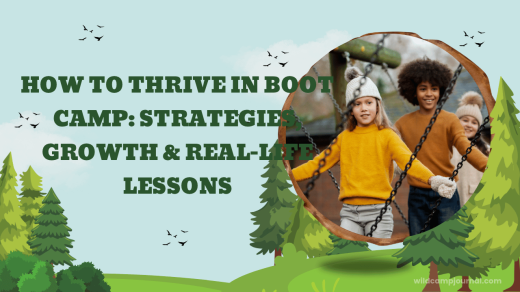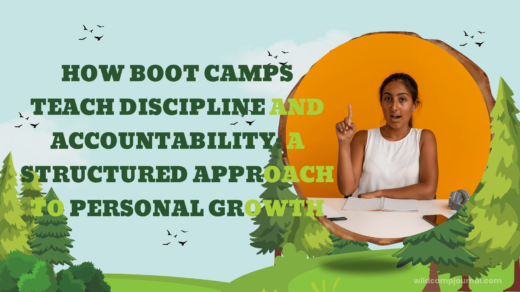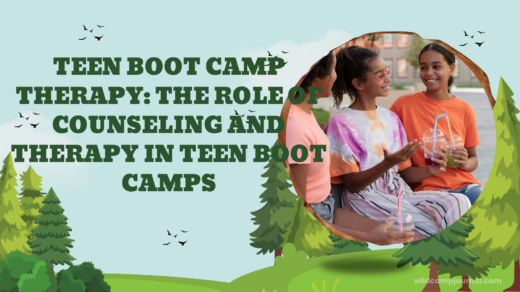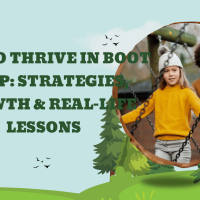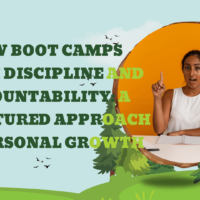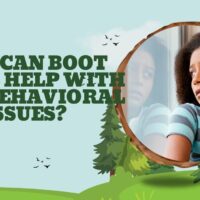Teen boot camps are often associated with discipline and strict routines, but their purpose extends far beyond correcting behavior.
These programs are designed to equip teens with practical life skills that will serve them throughout their adult lives.
By blending structured activities, teamwork, and skill development, boot camps provide teens with the tools to thrive in personal and professional environments.
Table of Contents
Purpose of Teen Boot Camps: Beyond Discipline and Structure

Teen boot camps are about more than enforcing rules—they provide a holistic foundation for a teen’s growth.
Here are the key purposes of these programs beyond discipline:
- Building a Sense of Responsibility: Teens learn to take accountability for their actions and choices, fostering a mindset that actions have consequences both positive and negative.
- Developing Adaptability and Resilience: Boot camps expose teens to challenges that push them out of their comfort zones, teaching them to adapt and build mental toughness in the face of difficulties.
- Creating a Safe Space for Growth: While structured, these programs offer a supportive environment where teens can explore their strengths and weaknesses without judgment.
- Teaching the Value of Teamwork and Collaboration: Through group activities and teamwork exercises, teens understand the importance of working together to achieve common goals.
- Promoting Positive Behavioral Changes: Boot camps guide teens toward healthier habits and constructive decision-making through consistent reinforcement of good behavior.
- Instilling Leadership Qualities: Teens learn to take initiative and build confidence as they are given opportunities to lead and inspire their peers.
- Encouraging Independence and Self-Sufficiency: The structured yet challenging environment motivates teens to rely on themselves, preparing them to manage future personal and professional situations independently.
By addressing these core areas, teen boot camps become transformative experiences that set participants on the path to personal success and well-being.
Importance of Life Skills For Teens for Adulthood

Life skills are essential tools that allow teens to navigate adulthood successfully and independently.
Here are key reasons why life skills are so important in preparing teens for adulthood:
- Improves Decision-Making Abilities: Life skills equip teens with strategies to assess situations and make thoughtful, informed decisions under various circumstances.
- Builds Confidence and Self-Reliance: By teaching teens essential skills such as budgeting, household management, and communication, they develop the confidence to face adulthood head-on without excessive reliance on others.
- Promotes Time Management and Organization: Teens learn how to plan their day effectively, prioritize tasks, and manage their time wisely, preparing them for personal and professional responsibilities.
- Teaches Financial Literacy: Boot camps provide tools for teens to understand basic financial concepts, including budgeting, saving, and spending responsibly.
- Enhances Emotional Resilience: Life skills training focuses on managing emotions, handling setbacks, and coping with stress, ensuring teens are emotionally prepared for challenges in life.
- Develops Effective Communication Skills: Teens are taught how to express themselves clearly and listen actively, improving their ability to form strong relationships both personally and professionally.
- Encourages Healthy Habits: By instilling practices such as good nutrition, exercise, and sleep hygiene, life skills programs promote long-term physical and mental well-being.
- Fosters Independence and Responsibility: Teens gain a sense of accountability and learn how to manage their actions, ensuring they can operate independently as they transition to adulthood.
- Strengthens Problem-Solving Abilities: Boot camps provide practical scenarios where teens develop critical thinking and problem-solving skills to overcome challenges.
- Prepares Teens for Real-World Challenges: Teens learn essential skills like first aid, survival tactics, and teamwork, ensuring they can adapt and respond to everyday situations and emergencies effectively.
Overview: 50 Life Skills Taught in Teen Boot Camps

This article explores 50 life skills taught in teen boot camps, categorized into key areas essential for personal growth and independence.
Each section provides insights into how these skills are taught, why they are important, and how they prepare teens for real-world challenges.
From communication and leadership to health, survival, and financial literacy, this guide offers a comprehensive overview of the invaluable life lessons teens gain from boot camp programs.
Personal Responsibility and Accountability
Understanding Personal Accountability
Personal accountability is about owning one’s actions, decisions, and their outcomes.
In teen boot camps, this critical life skill is emphasized through lessons and hands-on techniques to ensure teens develop a sense of responsibility.
- Why Accountability Matters in Personal and Professional Life?: Teens learn that taking responsibility leads to trust, growth, and respect both personally and professionally. Accountability builds character and forms the foundation of success in all areas of life.
- Tools and Methods Taught for Self-Reflection: Boot camps utilize journaling, feedback sessions, and self-reflection exercises. These tools help teens evaluate their actions, understand mistakes, and create plans to improve.
Goal Setting and Achievement
Setting and achieving goals is an invaluable skill that promotes focus and motivation.
Teen boot camps teach goal-setting frameworks to help participants set realistic and achievable targets.
SMART Goals Framework
Teens are introduced to the SMART (Specific, Measurable, Achievable, Relevant, and Time-bound) goal structure. This approach ensures goals are clear and attainable.
Example: Instead of setting a vague goal like “I want to be healthier,” a SMART goal would be, “I will exercise 30 minutes a day, 4 times a week, for the next 2 months.”
Step-by-Step Guide to Breaking Down Large Goals
Teens are taught how to split large goals into smaller, actionable steps. This method reduces overwhelm and allows for incremental success, keeping motivation high.
Example
- Identify the big goal (e.g., improving academic performance).
- Break it into smaller steps (e.g., attending tutoring sessions, creating a study schedule, completing assignments early).
- Track progress and celebrate achievements along the way.
Building a Strong Work Ethic
Developing a strong work ethic prepares teens for success in both academics and their future careers.
Boot camps emphasize discipline, responsibility, and the value of hard work.
Techniques to Develop Discipline and Commitment
Teens participate in time-bound activities, structured tasks, and practice adhering to deadlines. They learn that consistent effort produces long-term results.
Importance of Consistency in Achieving Success
Through repetitive tasks, teens understand that success isn’t achieved overnight. Consistency builds habits and creates a pathway toward achieving bigger goals in life.
Example
Daily tasks like physical exercises or study sessions teach teens the benefits of perseverance and focus.
Effective Time Management

Prioritization and Planning Skills
Managing time effectively starts with learning how to prioritize tasks and create structured plans.
Teen boot camps teach techniques that build these skills, ensuring teens develop strong habits.
Techniques for Creating Priority Lists: Teens are introduced to practical tools like to-do lists and task categorization.
For instance:
- List all tasks to be completed.
- Rank tasks by urgency and importance.
- Focus on completing high-priority tasks first.
Techniques such as the Eisenhower Matrix help teens categorize tasks into:
- Urgent and Important (do immediately)
- Important but Not Urgent (schedule for later)
- Urgent but Not Important (delegate if possible)
- Not Urgent and Not Important (eliminate).
The Importance of Identifying Urgent vs. Important Tasks
Teens learn that understanding the difference between urgency and importance prevents wasting time on non-essential tasks, enabling them to focus on activities that contribute to long-term success.
Building and Following Schedules
A key element of time management is the ability to plan and stick to a schedule.
Teen boot camps teach teens practical tools and strategies for organizing their day.
How to Use Calendars, Timers, and Planners Effectively
Teens are taught to:
- Use planners or digital calendars (e.g., Google Calendar) to allocate time slots for tasks.
- Utilize timers (like the Pomodoro technique) to focus on work for fixed intervals, followed by short breaks.
- Schedule deadlines to create accountability and ensure tasks are completed on time.
Consequences of Poor Time Management
Teens are shown real-world examples of how poor time management leads to missed deadlines, increased stress, and failure to meet goals.
By understanding these consequences, they learn the value of planning.
2.3 Managing Procrastination
Procrastination can derail success, but teen boot camps equip teens with strategies to overcome it.
Proven Strategies to Stay Motivated and Focused
- Break tasks into smaller, manageable steps.
- Set short-term rewards for completing tasks (e.g., a break after finishing a chapter).
- Visualize success to stay motivated.
Tools Taught to Avoid Distractions
Boot camps teach tools like:
- Digital detox: Turning off notifications during work sessions.
- Time-blocking: Allocating specific times to focus solely on a task.
- Focus apps: Using tool Focus@Will to maintain concentration.
By learning how to identify distractions and stay focused, teens build habits that enhance productivity and success.
Communication and Interpersonal Skills

Active Listening Techniques
Active listening is a cornerstone of effective communication, teaching teens to truly hear and understand others.
Boot camps emphasize the following techniques:
How to Pay Attention and Improve Listening Abilities
Teens learn to give undivided attention during conversations by:
- Maintaining eye contact to show interest and focus.
- Avoiding distractions such as phones or wandering thoughts.
- Summarizing or paraphrasing the speaker’s words to ensure clarity.
These exercises help teens recognize the importance of being fully present in conversations.
Practicing Patience and Empathy in Conversations
Teens are taught to listen without interrupting, allowing the speaker to express themselves fully.
Activities like role-playing help teens develop empathy by encouraging them to imagine the speaker’s feelings and viewpoints, fostering better connections in their relationships.
Conflict Resolution
Conflict is an inevitable part of life, but learning how to address it constructively helps teens build stronger interpersonal relationships.
Boot camps provide practical tools and real-life scenarios for managing disputes effectively.
Tools and Role-Play Scenarios for Problem-Solving: Teens participate in exercises that simulate real-life conflicts, allowing them to practice problem-solving.
These tools include:
- Identifying the core issue at hand.
- Using “I” statements to express feelings and needs (e.g., “I feel upset when…” instead of placing blame).
- Brainstorming solutions collaboratively and agreeing on a resolution.
Understanding Differing Perspectives in Conflict Resolution
Teens learn to look beyond their perspective to understand others’ motives and feelings.
Boot camps use reflective discussions to help teens recognize that empathy and an open mind can de-escalate tensions and pave the way for compromise.
Building Teamwork and Collaboration
In a world where collaboration is essential, boot camps teach teens how to work effectively within a group, emphasizing the value of diverse perspectives and teamwork.
The Importance of Working with Diverse Groups
Teens participate in group challenges where each member’s role contributes to achieving a common goal.
By working with peers from different backgrounds, teens learn to appreciate varied viewpoints, fostering mutual respect and inclusivity.
Real-Life Exercises to Improve Teamwork: Boot camps incorporate activities such as:
- Team sports or obstacle courses to build trust and cooperation.
- Problem-solving challenges like escape room simulations to develop creative thinking and collaboration.
- Group reflections where teens assess their team’s dynamics, identifying strengths and areas for improvement.
These exercises help teens understand the value of delegation, effective communication, and the power of a unified effort.
Emotional Resilience and Mental Toughness

Stress Management Techniques
Handling stress effectively is a cornerstone of emotional resilience.
Boot camps teach practical strategies for recognizing and reducing stress.
Understanding Stress Triggers
Teens learn to:
- Identify personal stressors (e.g., exams, social pressures).
- Reflect on how stress impacts their physical and emotional health.
Breathing Exercises, Meditation, and Coping Mechanisms
Strategies include:
- Deep breathing exercises to calm the mind.
- Guided meditations to manage anxiety.
- Positive coping mechanisms such as journaling or engaging in hobbies.
Developing Emotional Intelligence
Recognizing and managing emotions effectively is central to emotional intelligence.
Teen boot camps emphasize these skills through engaging activities.
Recognizing Emotions in Oneself and Others
Teens are taught to:
- Pay attention to emotional cues like facial expressions or tone of voice.
- Reflect on their feelings to understand their emotional state.
Strategies to Manage Emotional Outbursts
Boot camps introduce:
- Techniques like “pause and reflect” before responding impulsively.
- Journaling as a tool to process emotions constructively.
Overcoming Challenges and Setbacks
Building mental toughness involves developing perseverance and a positive mindset when facing obstacles.
Teaching Perseverance Through Simulated Obstacles
Activities include:
- Physical challenges (e.g., obstacle courses) to push beyond comfort zones.
- Role-playing scenarios that simulate real-life setbacks.
Why Failure is an Essential Teacher
Teens learn:
- How to view failure as an opportunity for growth and learning.
- Resilience techniques to bounce back stronger after setbacks.
Health, Fitness, and Well-Being

Physical Fitness Fundamentals
Physical fitness contributes to overall well-being and mental clarity. Boot camps introduce teens to structured fitness routines
Introducing Daily Exercise Routines: Teens participate in activities like jogging, strength training, and team sports, emphasizing consistency and enjoyment.
Health Benefits of Physical Fitness in Teens: Exercise improves mood, reduces stress, and builds resilience. Physical fitness also promotes better sleep and enhances academic performance.
Nutrition Basics and Healthy Eating
A balanced diet fuels the body and mind. Boot camps teach teens practical skills to adopt healthier eating habits.
Importance of Balanced Diets: Lessons cover the food groups, the importance of portion control, and how nutrients support physical and mental health.
Practical Lessons on Meal Planning and Preparation: Teens learn to prepare simple meals, read food labels, and plan grocery lists. These skills encourage self-reliance and healthier eating patterns.
Rest, Recovery, and Sleep Hygiene
Rest is essential for productivity and health. Boot camps emphasize the importance of prioritizing recovery and sleep.
Teaching Teens How to Build a Healthy Sleep Routine: Teens are guided to establish bedtime routines, avoid screens before sleep, and maintain a consistent sleep schedule.
Managing Fatigue and Burnout: Strategies like recognizing early signs of burnout, scheduling regular breaks, and finding balance between work and rest are incorporated into the daily routines of teens.
These practices ensure that they recharge effectively and prevent mental and physical exhaustion.
Practical Survival and Safety Skills
Teen boot camps provide essential survival and safety skills, empowering teens to handle emergencies, navigate outdoor environments, and safeguard themselves and others.
Outdoor Survival Basics
Outdoor survival skills instill confidence and adaptability in challenging situations.
Teens learn to navigate and thrive in nature, promoting resilience and problem-solving.
Learning Essential Survival Skills in Outdoor Settings: Teens practice building shelters, starting fires, and sourcing clean water.
These skills prepare them for emergency situations or recreational adventures.
Emergency Preparedness and Basic Navigation Techniques: Navigation training includes reading maps, using compasses, and orienting with natural landmarks.
Teens create and practice emergency plans, learning to prioritize safety and survival in unforeseen circumstances.
First Aid and Basic CPR Training
First aid and CPR are lifesaving skills every teen should know.
Boot camps focus on providing hands-on training to manage injuries and medical emergencies effectively.
The Role of First Aid in Saving Lives: Teens learn the importance of immediate response during emergencies to minimize risks and improve outcomes.
Key areas include treating wounds, burns, and fractures.
Hands-On Skills to Manage Common Injuries: Applying bandages, handling sprains, and stabilizing injuries until professional help arrives.
CPR training focuses on compressions and rescue breathing, using realistic mannequins to practice these critical skills.
Safety Awareness and Emergency Procedures
Safety is a cornerstone of independent living. Teens learn protocols to stay vigilant and act appropriately in emergencies at home, school, and public spaces.
Understanding Safety Protocols at Home and in Public
Lessons cover:
- Fire Safety: Using extinguishers, creating escape routes, and understanding smoke detector alarms.
- Personal Safety: Avoiding risky situations, recognizing potential dangers, and seeking help when needed.
Mock Drills for Fire and Other Emergencies
Teens participate in simulations to practice responding to real-world emergencies, such as fire evacuations or earthquake preparedness.
Drills include clear instructions on staying calm and ensuring others’ safety, fostering quick and organized responses during crises.
Financial Literacy

Understanding financial literacy early in life is essential for preparing teens to make informed decisions about money and develop habits that ensure long-term financial stability.
Budgeting and Money Management Basics
Budgeting is the foundation of good financial management.
Teens learn how to allocate funds wisely and track their spending.
Teaching the Importance of Saving and Budgeting
- Teens are taught to prioritize needs over wants and establish clear savings goals.
- They learn about the benefits of financial planning, including reduced stress and greater security.
Step-by-Step Guides for Tracking Expenses
- List Expenses: Categorizing fixed and variable expenses such as groceries, entertainment, and school supplies.
- Set Budgets: Teens allocate a specific amount for each category, promoting thoughtful decision-making.
- Monitor Spending: Tools like mobile apps, spreadsheets, or simple notebooks help track every expense for better visibility.
Understanding Saving vs. Spending
Recognizing the value of saving and knowing when to spend are critical skills for responsible financial habits.
Tools to Manage Impulsive Spending
- Teens are introduced to “delayed gratification strategies” to resist unnecessary purchases.
- Practical exercises include creating wish lists or waiting 30 days before making non-essential purchases.
Lessons on Short-Term and Long-Term Savings
- Short-Term Savings: Allocating money for immediate goals, such as buying a bike or going on a trip.
- Long-Term Savings: Educating teens on saving for significant future expenses like college, vehicles, or emergency funds.
Introduction to Personal Finance Skills
Personal finance knowledge goes beyond saving and budgeting to encompass understanding complex concepts that will be vital later in life.
Understanding Credit, Loans, and Basic Investment Principles
Lessons include how credit scores work, the importance of paying loans on time, and the risks and rewards of investments.
Teens learn about compound interest and how starting investments early can significantly increase savings over time.
The Role of Personal Finance for Future Independence
Real-life scenarios highlight how financial literacy fosters independence and reduces reliance on others.
Teens explore decision-making exercises, such as choosing between options like renting vs. buying or saving vs. spending on luxury items.
Leadership and Decision-Making Skills
Leadership and decision-making are transformative skills that empower teens to guide themselves and others effectively, even in challenging circumstances.
Boot camps instill these competencies through interactive exercises and real-world scenarios.
Decision-Making Techniques
Making sound decisions is essential for personal growth and success. Teens are taught frameworks to evaluate choices and consequences rationally.
Teaching Teens How to Make Good Decisions Under Pressure
- Techniques like taking a pause: Teens are taught to assess situations calmly before reacting impulsively.
- Boot camps simulate high-pressure scenarios, such as team debates or emergency decision-making drills, to develop quick, thoughtful responses.
Analyzing Pros and Cons with Examples
- Teens practice decision trees to visualize potential outcomes of different choices.
Real-Life Examples:
- Choosing between extracurricular activities to balance academics and personal growth.
- Deciding how to allocate time for studying, leisure, and part-time work.
Foundations of Leadership
Leadership isn’t just about authority; it’s about accountability, inspiration, and guiding others toward shared goals.
Teens discover and refine their leadership potential through structured activities.
Identifying Leadership Strengths Through Teamwork Exercises
- Activities like group projects, obstacle courses, and role-playing highlight individual strengths in communication, delegation, and strategy.
- Teens receive feedback from peers and mentors to recognize and develop their unique leadership qualities.
Leadership Roles and Responsibilities Taught at Boot Camps
Emphasis is placed on:
- Leading by Example: Demonstrating honesty, reliability, and a positive attitude.
- Communication: Encouraging open dialogue within teams.
- Decision Making: Taking responsibility for team outcomes.
Critical Thinking and Problem Solving
Critical thinking and problem-solving are intertwined with leadership and decision-making.
Teens learn structured approaches to navigate complex challenges effectively.
The Value of Approaching Problems Logically
- Boot camps introduce logical reasoning exercises, like puzzles and brain teasers, to teach problem analysis.
- They stress maintaining emotional composure, even when situations seem overwhelming.
Structured Methods for Evaluating Solutions
Methods Include:
- SWOT Analysis: Breaking down a problem by assessing strengths, weaknesses, opportunities, and threats.
- Root Cause Analysis: Identifying the origin of a problem instead of treating symptoms.
Practical Scenarios:
- Solving a hypothetical issue, such as organizing a community fundraiser with limited resources.
- Navigating team conflicts using empathy and logical solutions.
Social Responsibility and Moral Values
Teen boot camps emphasize the importance of contributing positively to society, fostering strong moral principles, and building empathy.
These lessons lay a foundation for responsible adulthood and meaningful connections.
Building Empathy and Compassion
Empathy enables teens to understand and value the feelings and perspectives of others, fostering stronger interpersonal relationships and social harmony.
How Service Activities Teach Empathy
- Participating in community service projects, such as helping in food banks or working with the elderly, encourages teens to engage with diverse populations.
- Experiencing the challenges others face firsthand inspires a deeper appreciation of human diversity and resilience.
Importance of Understanding Others’ Situations
- Lessons include discussions, storytelling, and role-playing exercises that simulate different life experiences.
- Teens practice active listening to comprehend different points of view and cultivate emotional sensitivity.
Understanding Ethical Behavior
Developing a strong sense of right and wrong prepares teens to make principled decisions in personal and professional settings.
What It Means to Make Moral Choices
- Teens are guided to distinguish ethical principles from societal pressures or personal biases.
- Case studies and debates on real-life dilemmas, such as standing up to peer pressure or whistleblowing, highlight the nuances of ethical decision-making.
Lessons Through Real-Life Ethical Dilemmas
- Scenarios explore challenges like fairness in competitions or respecting intellectual property.
- Group discussions focus on analyzing outcomes, emphasizing integrity and accountability in all actions.
Volunteerism and Giving Back
Actively contributing to society strengthens teens’ sense of responsibility and fosters personal growth by building stronger ties to their communities.
Engaging Teens in Community Service Projects
- Projects include cleaning parks, participating in charity runs, or tutoring younger students.
- Teens reflect on the impact of their work during debrief sessions, understanding how small actions contribute to larger social changes.
Benefits of Contributing to Society
- Builds self-esteem and satisfaction from making a positive difference.
- Develops leadership, teamwork, and problem-solving skills through active participation in social causes.
- Inspires lifelong habits of giving back, fostering a ripple effect of social improvement.
Independent Living Skills
Equipping teens with independent living skills ensures they can transition seamlessly into adulthood. These lessons focus on the practical aspects of daily life, fostering autonomy and confidence.
Household Management Basics
Managing a home effectively is an essential life skill. Teens learn to maintain a clean, organized, and efficient living space.
Cleaning, Organizing, and Daily Household Routines
- Teens practice tasks like cleaning bathrooms, vacuuming, and doing laundry.
- Organizing exercises include decluttering spaces, arranging storage, and creating functional workflows in the home.
Tips to Manage Chores Effectively
- Use a Chore Schedule: Assigning specific tasks to specific days prevents procrastination.
- Set Timers: Encourages focused effort and reduces time spent on distractions.
- Create Zones: Dividing the home into manageable sections to prioritize cleaning or organizing one area at a time.
Personal Hygiene and Self-Care
Hygiene and self-care are fundamental for maintaining physical health and confidence. Teens are taught the importance of consistent practices and how they contribute to overall well-being.
Establishing a Self-Care Routine
- Teens design a personalized schedule that includes daily tasks like brushing teeth, bathing, and skincare.
- Workshops stress the significance of maintaining routine medical check-ups, hydration, and nutrition.
Understanding Grooming, Health, and Hygiene Practices
- Grooming lessons cover everything from hairstyling to shaving, tailored to gender-specific needs.
- Hygiene sessions educate teens on topics like preventing illnesses through regular handwashing and staying odor-free with proper deodorant use.
Basic Cooking and Food Preparation
Cooking is a critical life skill, and boot camps ensure teens feel confident in the kitchen with practical, hands-on training.
Hands-On Training for Simple Meal Planning
- Teens learn to plan meals by considering nutritional needs, portion sizes, and budgeting.
- Recipes include simple, nutritious dishes such as scrambled eggs, sandwiches, soups, and one-pot meals.
Teaching Food Safety Basics
- Proper Handling of Ingredients: Emphasis on washing produce, cooking meat thoroughly, and avoiding cross-contamination.
- Understanding Kitchen Safety: Lessons on handling knives, using ovens and stovetops responsibly, and preventing fires or spills.
Why Boot Camp Life Skills Prepare Teens for the Future
Teen boot camps serve as an invaluable stepping stone into adulthood. These programs prepare participants by:
- Enhancing Independence: Teens leave boot camp with practical skills that enable self-sufficiency.
- Instilling Resilience: Coping mechanisms and perseverance taught at boot camps provide tools to face life’s challenges head-on.
- Fostering Leadership and Responsibility: From decision-making to team-building, teens develop qualities that benefit future careers and relationships.
- Creating Lifelong Habits: The structured learning environment reinforces habits that help maintain physical, emotional, and financial health.
Final Thoughts: The Impact of Empowering Teens with Practical Skills

By teaching these foundational life skills, teen boot camps have a lasting impact on participants’ lives. The blend of hands-on learning, emotional growth, and practical training transforms young individuals into capable, motivated, and confident adults.
Teen boot camps provide a transformative experience by equipping participants with a well-rounded toolkit of essential life skills. These programs are about more than discipline; they empower teens to navigate life with confidence, resilience, and purpose.
When teens are equipped with the skills to navigate independence, make thoughtful decisions, and contribute positively to their communities, they not only improve their own futures but also pave the way for a more responsible and empathetic society.
Investing in such transformative programs is an investment in the leaders, innovators, and changemakers of tomorrow.
FAQs
What is the main purpose of a teen boot camp?
The primary purpose of a teen boot camp is to provide structure, discipline, and practical skills that help teens become independent, responsible, and resilient individuals. These programs focus on personal development and instilling positive habits that prepare teens for adulthood, rather than simply addressing behavioral issues.
Are the skills taught tailored for troubled teens only?
No, teen boot camps are not solely for troubled teens. While they can benefit teens dealing with behavioral or emotional challenges, these programs are designed for any adolescent who wants to build foundational life skills, develop character, and grow in areas like leadership, decision-making, and resilience.
How long does it take for teens to acquire these life skills?
The duration of teen boot camps can vary from a few weeks to several months. Even within a short timeframe, the focused, intensive curriculum helps teens learn essential skills. Mastery of these skills, however, depends on continued practice after the program. Boot camps often provide tools and strategies to encourage teens to apply what they’ve learned in their daily lives.
How do boot camps teach life skills differently from traditional schools?
Teen boot camps teach life skills through a hands-on and immersive approach. Unlike traditional schools that focus on theoretical learning, boot camps use practical methods such as simulations, role-playing, structured routines, and small group mentorship. This makes the skills more applicable and easier for teens to retain and practice in real-life situations.
Can these life skills be applied in real-world adult situations?
The life skills taught in teen boot camps are highly practical and directly applicable to real-world adult situations. Skills like time management, leadership, financial literacy, and conflict resolution prepare teens for independence, professional environments, and personal growth as they transition into adulthood.



